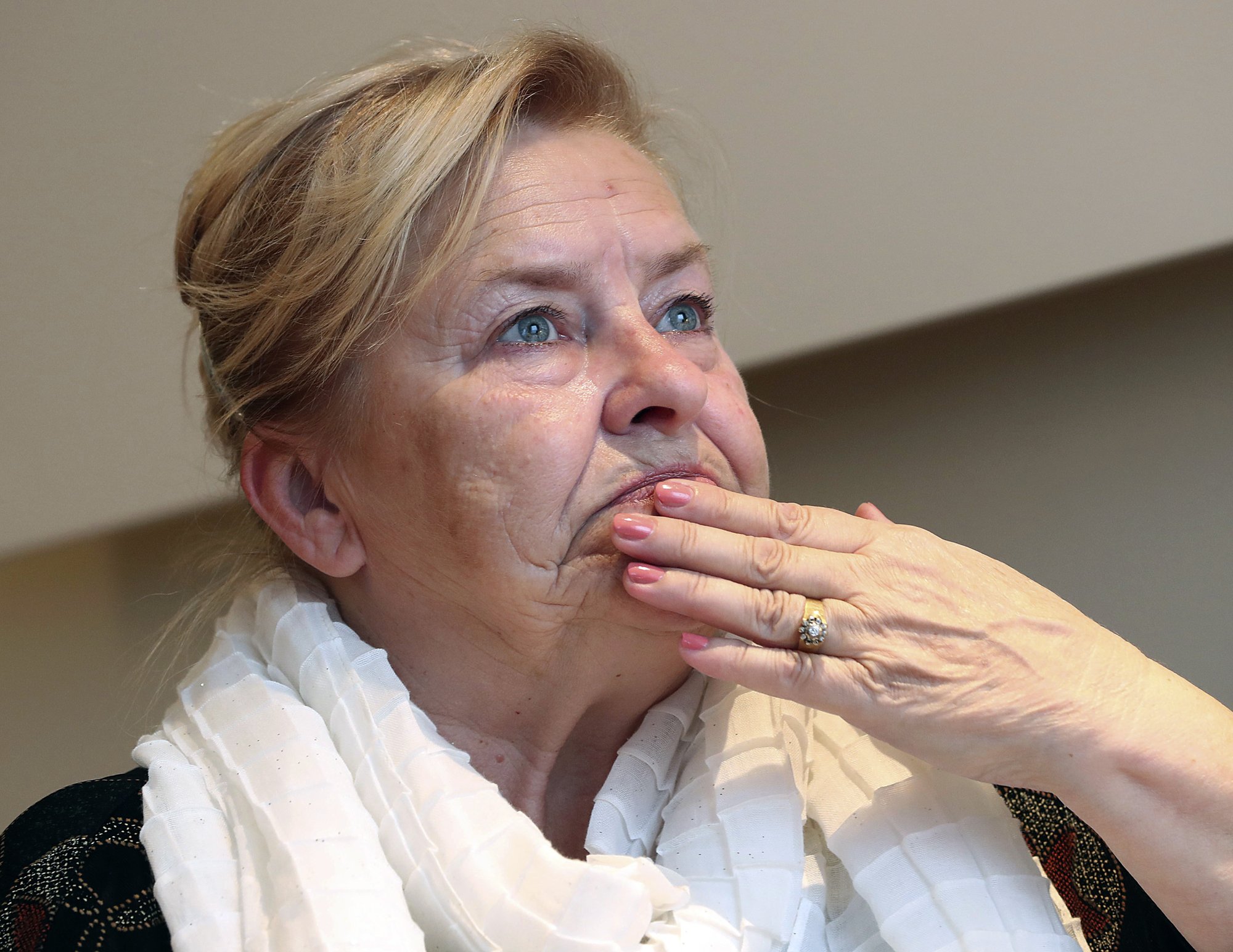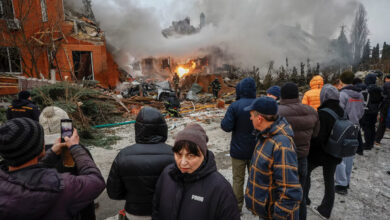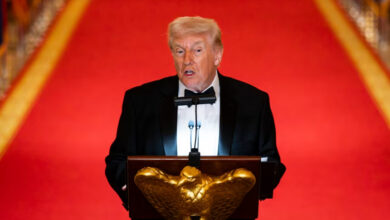
WARSAW, Poland (AP) — One victim spoke out, and then another, and another. A statue of a pedophile priest was toppled in Gdansk, put back by his supporters, and finally dismantled for good. A feature film about clerical abuse was a box office hit.
Poland thought it had started confronting the problem of clerical abuse and its cover-up by church authorities. Then a bombshell came: A documentary with victim testimony so harrowing it has forced an unprecedented reckoning with pedophile priests in one of Europe’s most deeply Catholic societies.
Poland’s bishops acknowledged this week they face a crisis and made a rare admission that they have failed to protect the young. It’s also a crisis for the country’s conservative government, which is closely aligned with the Catholic Church, putting the ruling Law and Justice party on the defensive before Sunday’s European Parliament vote in Poland.
The documentary ”Tell No One ” was directed by journalist Tomasz Sekielski. Before its release on May 11, ruling party leader Jaroslaw Kaczynski had described discussion about clerical abuse as a “brutal attack” on the church and portrayed the LGBT rights movement as the key threat to children in the country. But the revelations in the documentary have pushed the party to face up to the cleric abuse crisis. It has vowed stiffer penalties for pedophilia, although its leaders have avoided pointing a finger at the church specifically.
Across the country, the film has triggered soul searching and raised questions, including whether the same bishops who moved perpetrators from parish to parish for years will be capable of cleansing the church. Some wonder if Poland, which is already being reshaped by economic growth and secularization, could eventually follow Ireland, where the abuse crisis broke the Catholic Church’s hold on society.
Crowdfunded and free on YouTube, “Tell No One” has gotten more than 21 million views so far and has prompted a new wave of survivors to come forward. About 150 people have contacted a foundation helping victims of clerical abuse, “Have No Fear.” One was an 86-year-old man who was molested when he was 6 and had never told anyone until now.
“He finally understood that he is not alone,” said Anna Frankowska, a lawyer for the organization who took his call.
“A huge tsunami has come, and there is no way this issue can be swept under the rug now,” she said. “It has to be addressed.”
Michal Wojciechowicz, a 54-year-old abused in his youth by a prominent Solidarity-era priest, the late Rev. Henryk Jankowski, sees a “revolution” whose time has come thanks to clerical sexual abuse revelations elsewhere as well as reforms by Pope Francis.
“The Catholic Church had power over people for centuries. We needed to wait for the right time, and this is the right time,” said Wojciechowicz, a writer. “The most important thing is that people are now willing to listen.”
The church has played an inspirational role in Poland, keeping its language and culture alive during a long era of occupation and foreign rule and supporting the anti-communist Solidarity movement in the 1980s. To generations, the church has been an advocate for freedom and a source of solace under hardship, and to many, Catholic faith and traditions are synonymous with Polishness itself.
A Polish pope who is now a saint, John Paul II, was a moral authority and a political hero for opposing communism, but even his legacy is now in question due to his failure to tackle clerical abuse.
Recognition of the problem came slowly at first. A book published six years ago by a Dutch journalist had the accounts of Polish victims and five years ago ”Have No Fear ” was founded to offer victims counseling and legal help. But the last eight months have brought the most dramatic milestones. A feature film about corrupt, abusive priests, “Clergy,” was a blockbuster after its September release.
Then in December, Barbara Borowiecka, 62, told Polish media about being abused when she was 11 by Jankowski, a prominent prelate in Lech Walesa’s anti-communist Solidarity movement in Gdansk, where a monument of him stood.
Borowiecka was encouraged to tell her story by another priest who brought her back to the church after a nearly five-decade break. Before his death in 2016, he made her promise to publicly name her aggressor when she was strong enough.
Shaken by Borowiecka’s story, three activists from Warsaw — Konrad Korzeniowski, Rafal Suszek i Michal Wojcieszczuk — traveled to Gdansk in February and in the middle of the night put a rope around the Jankowski monument and pulled it down.
“There was something in Borowiecka’s story that chilled me to the bone. It was shocking. The length of her isolation, the embarrassment she had to feel, that her own mother didn’t believe her,” said Korzeniowski, a computer programmer. “Even though I was aware of what is happening in the church with pedophilia, it put a face to it, and I was crying.”
They placed children’s underwear, shoes and white lace church vestments on the toppled statue to symbolize his victims’ suffering, then called police to turn themselves in. They also accused Jankowski, the church and society at large for remaining indifferent to his crimes and the venomous anti-Semitism he spread in his sermons.
Poles awoke to news of the toppled statue as the Vatican began hosting a landmark meeting on clerical sex abuse.
Two days later, the priest’s supporters, shipyard workers in Gdansk, re-erected the statue. During a Mass in his former church, the parish priest recalled the good done by Jankowski, who died in 2010. Pressured to act, the city dismantled the statue.
Borowiecka was touched and incredulous that three strangers risked prison — they have been charged with “insulting a monument” though no trial date has been set — to give her the relief she that feels now that the statue is gone. She met them in Warsaw this month, a warm encounter that sealed new friendships.
Days later, “Tell No One” came out, showing victims psychologically destroyed even in adulthood by their childhood abuse, priests caught by hidden cameras confessing to wrongdoing and convicted offenders still working with children.
Sekielski, the director, has been taken aback by the response, which has included new investigations and at least one priest asking to be laicized.
“A mental revolution is happening in front of our eyes. Victims are being called victims and perpetrators called perpetrators,” he told the weekly magazine Polityka.
Suszek welcomed Poland’s new awareness of clerical abuse but disagreed a revolution is underway, saying there is no mass of rebels and fearing instead a wave of emotion that could easily die down.
“If you are about to start a revolution, then you’d better have a plan for the aftermath,” Suszek said. “And nobody has a clear-cut idea about how to deal with the void that would inevitably come about when you remove the institutional church from the public sphere.”
Image: In this photo taken on May 15, 2019, Barbara Borowiecka, a survivor of alleged abuse as a minor by a prominent Solidarity-era priest gestures during an interview with The Associated Press. A documentary film with testimony by victims of clerical abuse in Poland is so harrowing that it has forced an unprecedented reckoning with the problem in one of Europe’s most deeply Catholic societies. In December, Borowiecka, 62, told Polish media about being abused when she was 11 by Henryk Jankowski, a prominent prelate in Lech Walesa’s anti-communist Solidarity movement in Gdansk, where a monument of him stood. (AP Photo/Czarek Sokolowski)




